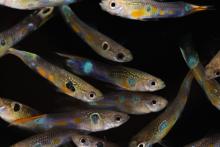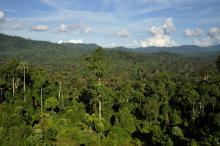University of British Columbia zoologist Sarah Otto is using her MacArthur “genius grant” toward preserving fragile habitats in the South Okanagan region of British Columbia.
Two gifts of $50,000 each to The Nature Trust of BC and the Nature Conservancy of Canada will help purchase habitats for at-risk species of woodpeckers, sparrows, badgers, turtles, plants and trees.
Otto was one of last year’s 22 MacArthur Fellows, who receive no-strings-attached grants of $500,000 over five years from the John D. and Catherine T. MacArthur Foundation.
“We strive to eat locally and act locally, and I would argue that we also need to preserve locally,” says Otto, a Canada Research Chair in Theoretical and Experimental Evolution.
B.C. grasslands make up less than one percent of the province’s natural landscape, yet they provide habitat for a third of B.C.’s species at risk. Nationally, only 10 per cent of Canada’s land areas and less than one per cent of the country’s oceans and Great Lakes are protected, according to 2011 Environment Canada figures.
“Many of the existing protected areas are remote and not the hotspots of potential biodiversity loss,” says Otto. “We are lagging behind in Canada, both in comparison to the global average and to our own previously agreed upon targets.”
Otto says the Okanagan region holds special personal significance as the location of her first biodiversity field trip as a new faculty member at UBC in 1995.
“Seeing this remarkable region, home to so many species from bighorn sheep to cacti, made me aware of the diversity of life in this part of Canada and also its fragility as an ecosystem,” says Otto, director of the Biodiversity Research Centre at UBC, who adds that the burrowing owls were lost to B.C. in the late 1970s before being reintroduced later on. “I don’t think we can ask other countries to preserve their forests, their waters, and ecosystems unless we also set a good example here in Canada.”
Otto will deliver a public lecture on the evolution of biodiversity and current extinction risks on Saturday, Nov. 3 at the Vancouver Institute. For more information, visit vaninst.ca/VbOtto.html
Musqueam First Nation land acknowledegement
We honour xwməθkwəy̓ əm (Musqueam) on whose ancestral, unceded territory UBC Vancouver is situated. UBC Science is committed to building meaningful relationships with Indigenous peoples so we can advance Reconciliation and ensure traditional ways of knowing enrich our teaching and research.
Learn more: Musqueam First Nation
Faculty of Science
Office of the Dean, Earth Sciences Building2178–2207 Main Mall
Vancouver, BC Canada
V6T 1Z4


